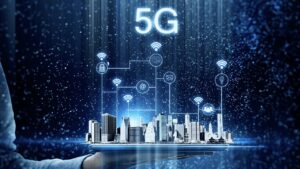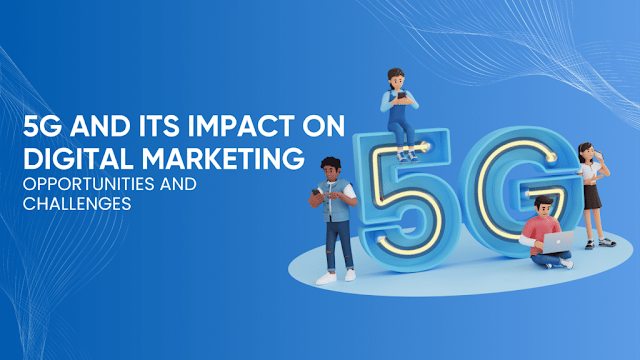5G and Its Impact on Digital Marketing: Opportunities and Challenges
As technology continues to rapidly advance, the arrival of 5G networks is set to revolutionize the digital landscape. With lightning-fast speeds and unprecedented connectivity, 5G has the potential to transform how brands engage with their target audiences online. In this blog post, we will explore the opportunities and challenges that 5G presents for digital marketing strategies, and how businesses can leverage this game-changing technology to stay ahead of the curve.
Introduction to 5G and its role in digital marketing
The world of digital marketing has been constantly evolving, with advancements in technology paving the way for new strategies and techniques. And now, the introduction of 5G is set to revolutionize the industry even further. 5G, or fifth-generation wireless technology, promises lightning-fast internet speeds and low latency, making it a game-changer for digital marketing.
So what exactly is 5G? In simple terms, it is the next generation of mobile broadband that will replace the current 4G LTE networks. It operates on a higher frequency band than its predecessors and uses advanced antennas to transmit data at much faster rates. With estimated speeds of up to 20 gigabits per second (20 times faster than 4G), 5G is poised to transform how we consume and interact with online content.
One of the most significant impacts of 5G on digital marketing is its potential to enhance user experiences. With faster download speeds, websites can load almost instantly, providing users with a seamless browsing experience. This means that businesses can create more immersive and engaging content without worrying about slow loading times driving away their audience.
Advantages of 5G for digital marketers: faster speed, lower latency, increased connectivity
The introduction of 5G technology has brought about significant changes and advancements in the digital world. With its lightning-fast speed, lower latency, and increased connectivity, 5G is set to revolutionize the way digital marketers operate. In this section, we will discuss in detail the advantages that 5G brings to digital marketing.
1. Faster Speed:
One of the most significant advantages of 5G for digital marketers is its blazing-fast speed. As compared to its predecessor, 4G LTE, 5G can deliver speeds up to twenty times faster. This allows for quicker data transfers and smoother browsing experience on mobile devices. For digital marketers, this means faster access to data and real-time analytics, enabling them to make informed decisions quickly.
Moreover, with faster download and upload speeds, content creation and distribution become much more efficient. This opens up new opportunities for creative campaigns by eliminating delays in uploading high-resolution videos or graphics-heavy content on various platforms.
2. Lower Latency:
Latency refers to the time taken by a device or network to respond to a request from another device or network. With lower latency rates of just one millisecond in 5G networks as compared to around ten milliseconds in 4G networks, there is minimal delay in data transfer.
For digital marketers who rely heavily on real-time communication tools like video conferencing or live streaming events on social media platforms like Facebook Live or Instagram Live, lower latency provided by 5G ensures a seamless experience with no lag time between interactions.
3. Increased Connectivity:
Another significant advantage of 5G for digital marketers is its increased connectivity capabilities. With more connected devices than ever before – such as smart homes and IoT devices – traditional networks are struggling to keep up with the demand for bandwidth.
However, with its higher-capacity spectrum bands, 5G can support a vast number of connected devices at once, making it easier for digital marketers to reach their target audiences. This opens up new opportunities for personalized messaging and targeted advertising.
Additionally, increased connectivity also means improved location-based marketing capabilities. With the ability to pinpoint a user’s location with greater accuracy, digital marketers can deliver hyper-targeted ads and offers based on their geographical location.

Opportunities for personalized and targeted marketing with 5G
5G technology has been hailed as the next big thing in the world of digital marketing. With its lightning-fast speed, low latency, and massive connectivity capabilities, 5G opens up a whole new realm of opportunities for personalized and targeted marketing strategies.
One of the key features of 5G is its ability to handle large amounts of data at incredibly high speeds. This means that marketers will have access to real-time data like never before. With this wealth of data at their disposal, businesses can gain deeper insights into consumer behavior and preferences, allowing them to create highly targeted and personalized campaigns.
Personalization has become a crucial aspect of modern-day marketing, as consumers are bombarded with generic advertisements every day. However, with 5G technology, businesses can now deliver personalized content in real-time based on a customer’s location, interests, online behavior, and even emotions. This level of personalization not only enhances the customer experience but also increases the chances of conversion.
Challenges of implementing 5G in digital marketing: cost, infrastructure, privacy concerns
As with any new technology, the implementation of 5G in digital marketing comes with its own set of challenges. These challenges can range from cost and infrastructure to privacy concerns. In this section, we will delve deeper into these challenges and explore how they may impact the adoption of 5G in digital marketing.
One of the most significant challenges of implementing 5G in digital marketing is the cost involved. Upgrading to a 5G network requires substantial investment in terms of hardware and software upgrades. This can be a barrier for smaller businesses or those with limited resources, as they may not have the budget to make such investments. Moreover, ongoing maintenance costs for 5G networks are also expected to be higher than previous generations, making it an ongoing expense for businesses.
Another challenge that businesses may face when adopting 5G in their digital marketing strategies is infrastructure. While major cities and urban areas are likely to have access to high-speed 5G networks, rural areas may not have the necessary infrastructure in place yet. This could create a divide between businesses operating in different locations, limiting their ability to effectively use 5G technology. Additionally, older devices and technologies may also not be compatible with 5G networks, requiring further updates and investments.
How 5G will revolutionize the way consumers interact with brands
The rollout of 5G technology has been highly anticipated and is expected to bring about significant changes in the way consumers interact with brands. With its promise of faster speeds, lower latency, and increased connectivity, 5G has the potential to revolutionize the digital marketing landscape.
One of the most notable impacts of 5G on digital marketing will be its ability to enhance customer experience. Brands will be able to deliver high-quality content such as videos, virtual reality experiences, and augmented reality campaigns seamlessly and in real-time. This will result in a more immersive and engaging experience for consumers, making it easier for brands to connect and build relationships with their target audience.
Moreover, the increased speed and lower latency of 5G networks will enable marketers to collect and analyze data at a much faster rate. This means that they can gain insights into consumer behavior in real-time, allowing them to personalize their marketing strategies accordingly. For instance, if a customer is browsing through products on an e-commerce website using their smartphone connected to a 5G network, marketers can use this information to send personalized offers or recommendations instantly.
Tips for businesses to prepare
G, also known as the General Data Protection Regulation, is a comprehensive data privacy law that came into effect on May 25th, 2018. This regulation has significant implications for businesses operating in the European Union, as well as those who handle personal data of EU citizens. As digital marketing relies heavily on collecting and processing customer data, it is essential for businesses to prepare and adapt to these new regulations. In this section, we will discuss some tips for businesses to prepare for G and its impact on digital marketing.
1. Understand the Scope of G:
The first step towards preparing for G is to fully understand its scope and how it applies to your business. The regulation not only affects companies based in the EU but also those outside the EU if they offer goods or services to EU citizens or monitor their behavior online. Therefore, it is crucial for businesses to carefully assess their operations and determine if they fall under G’s jurisdiction.
2. Conduct a Data Audit:
Once you have determined that your business falls under G’s scope, the next step is to conduct a thorough audit of all the personal data you collect and process. This includes identifying what type of data you collect, where it comes from, how you use it, and who you share it with. A data audit will help you understand what changes need to be made in order to comply with G’s requirements.
3. Obtain Consent:
Under G, consent must be freely given by individuals before their personal data can be collected and processed by businesses. This means that businesses should review their current methods of obtaining consent from customers and ensure that they are GDPR compliant. Consent must also be specific and informed – meaning individuals must know exactly what information they are providing consent for.
4.Understand Individual Rights:
G gives individuals more control over their personal data by granting them certain rights such as the right to access their data, correct any inaccuracies or delete their information altogether. Businesses should be aware of these rights and have processes in place to respond promptly to any requests from individuals.
5. Implement Data Protection Measures:
One of the core principles of G is that businesses must ensure the security and confidentiality of personal data. Therefore, it is essential for businesses to implement appropriate data protection measures such as encryption, access controls, and regular backups to safeguard against data breaches.
Preparing for G may seem like a daunting task but taking proactive steps can help businesses comply with these regulations and avoid hefty fines. By understanding the scope of G, conducting a data audit, obtaining consent, understanding individual rights, and implementing data protection measures; businesses can prepare themselves for the impact that G will have on digital marketing.
Conclusion
As we look towards the future, it is evident that 5G technology will have a significant impact on digital marketing. With its lightning-fast speed and low latency, it opens up new opportunities for businesses to reach their target audience in innovative ways. However, it also brings forth challenges such as increased competition and data privacy concerns. It is essential for marketers to stay updated and adapt to these changes in order to succeed in the ever-evolving world of digital marketing. By embracing the potential of 5G while being mindful of its challenges, businesses can truly harness its power and enhance their digital marketing strategies for success.



Comments
Post a Comment